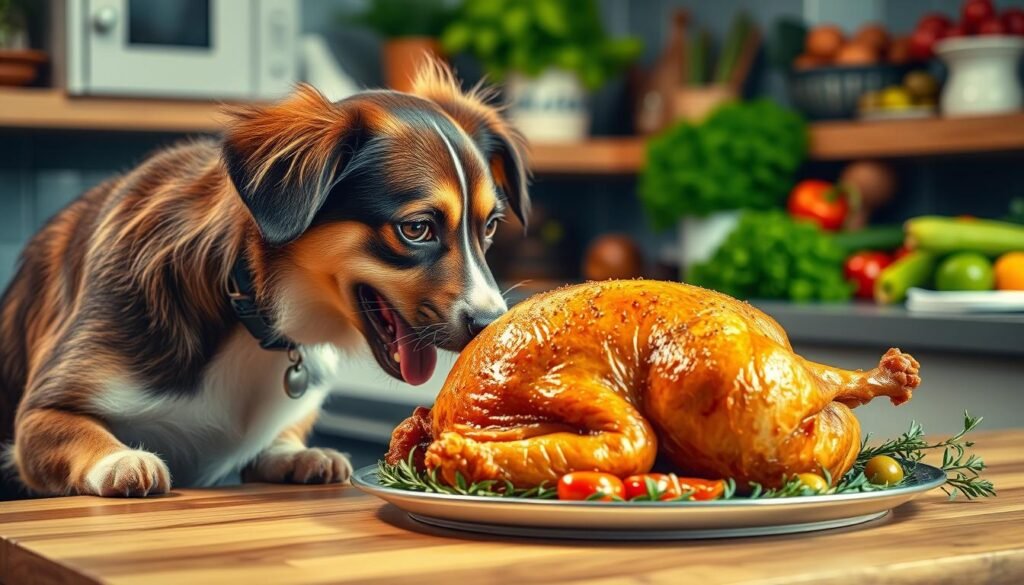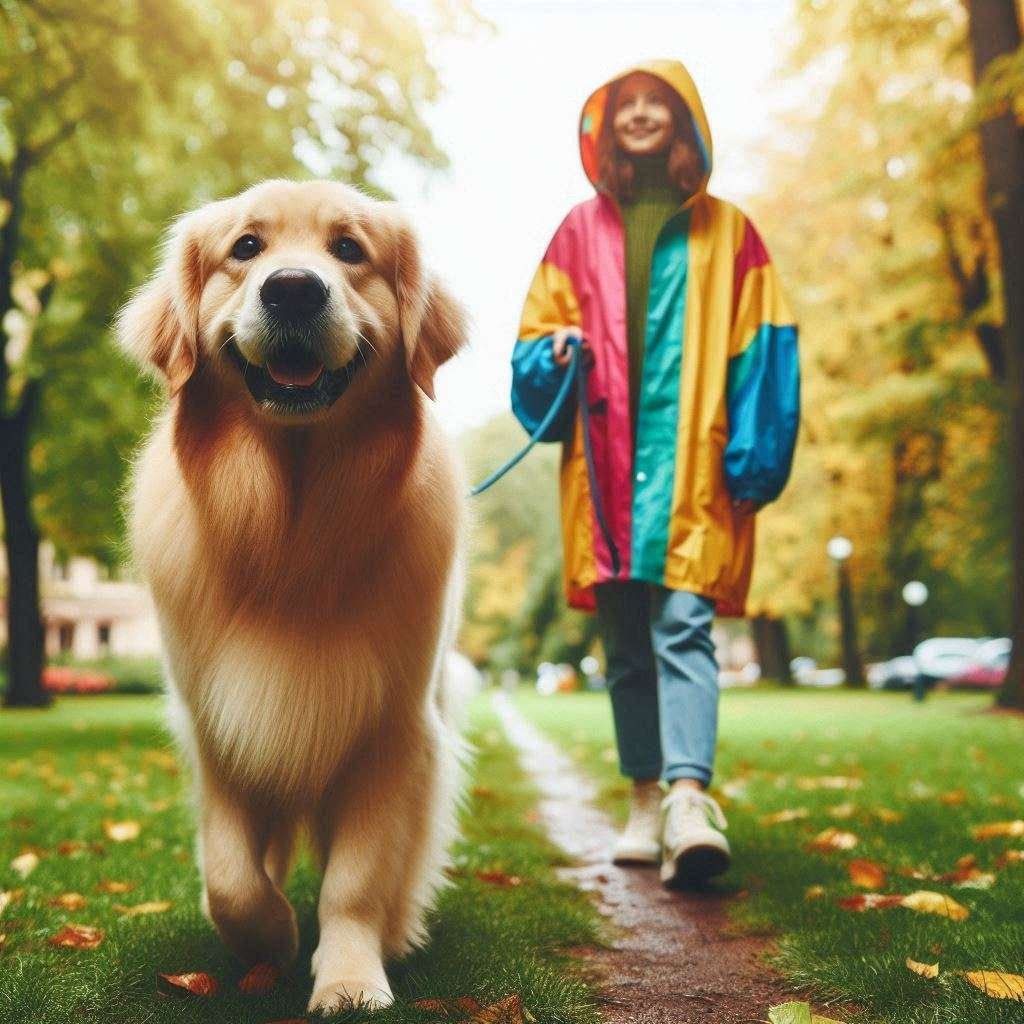Can dogs eat Turkey? As the holiday season gets closer, many pet owners wonder if they can share turkey with their dogs. The good news is that turkey can be a healthy choice for dogs. But, it’s important to know how to give it to them safely. This guide will help you understand the benefits, safety, and risks of turkey for dogs.

Key Takeaways
- Turkey can provide dogs with essential proteins and nutrients, but it must be introduced and served properly.
- Cooked turkey is generally safe for dogs, but raw turkey and certain turkey parts may pose health risks.
- Portion control and moderation are key when adding turkey to a dog’s diet to avoid digestive issues or weight gain.
- Certain turkey preparations, such as those with bones or high-fat content, can be dangerous for dogs and should be avoided.
- Consulting with a veterinarian is recommended before making significant changes to a dog’s diet, especially for dogs with existing health conditions.
The Benefits of Turkey for Dogs
Turkey is a nutritious meat that’s great for dogs. It has lots of protein, vitamins, and minerals. Plus, it’s low in fat, making it a good choice for a dog’s diet.
Essential Proteins and Nutrients
Turkey is packed with high-quality protein. This is key for keeping muscles strong and healthy. It also has vitamin B6, niacin, and phosphorus. These nutrients help with metabolism, immune function, and bone growth.
Low-Fat Meat Option for Dogs
Turkey has less fat than many other meats. This makes it a good choice for dogs that need to watch their weight. The lean turkey meat helps with weight management without sacrificing nutrients.
Amino Acids and Muscle Development
Turkey is full of amino acids. These are important for building and repairing muscles. Adding turkey to a dog’s diet supports muscle growth and keeps them fit and active.
Knowing the turkey nutritional value dogs get from it helps pet owners. They can choose to include it in healthy dog treats and pet nutrition plans. Turkey’s mix of protein, nutrients, and low fat makes it a great addition to a dog’s diet.
Can Dogs Eat Turkey: Safety Guidelines and Precautions
Feeding turkey to dogs needs careful thought. We must always put our pets’ health first. Here are some important steps to make sure your dog can enjoy turkey safely.
Proper Preparation and Serving Sizes
Before giving turkey to your dog, make sure it’s cooked right. Raw or undercooked turkey can have harmful bacteria like salmonella. Cook the turkey to 165°F (74°C) to kill these germs.
Also, watch how much turkey you give your dog. They should only have a little bit as a treat, not their main meal. Talk to your vet to find out how much is right for your dog’s size and diet.
Potential Hazards to Avoid
- Bones: Cooked turkey bones can splinter and pose a serious choking hazard or intestinal obstruction risk for dogs. Avoid feeding any bones to your canine companion.
- Skin and Fat: The skin and excess fat from turkey can be difficult for dogs to digest and may lead to gastrointestinal issues or pancreatitis.
- Seasonings and Spices: Many traditional turkey preparations include seasonings and spices that can be harmful to dogs. Stick to plain, unseasoned turkey when feeding it to your pet.
By following these guidelines, you can safely add turkey to your dog’s diet. Always check with your vet for advice on dog food safety and how much turkey is okay for your pet.
Raw vs. Cooked Turkey: What’s Best for Your Dog
Feeding turkey to your dog is a big decision. You have to choose between raw and cooked turkey. Each option has its own good points and risks.
Dangers of Raw Turkey
Raw turkey diets are popular, but they’re not safe. Raw turkey can have Salmonella and Campylobacter, causing stomach problems in dogs. Also, raw bones can choke or hurt your dog’s insides.
Proper Cooking Methods
To keep your dog safe, cook the turkey well. Baking, boiling, or grilling are best. These methods kill bad bacteria and make the turkey easier for your dog to digest.
Temperature Guidelines
- Cook turkey to at least 165°F (74°C) to kill bacteria.
- Let the turkey cool down before giving it to your dog.
- Don’t add spices, onions, or garlic because they’re bad for dogs.
By cooking the turkey right and following these tips, you can give your dog a healthy treat. This way, your dog gets a safe and tasty part of their diet.
| Consideration | Raw Turkey | Cooked Turkey |
|---|---|---|
| Food Safety | High risk of bacteria like Salmonella | Safer when properly cooked to 165°F |
| Bone Safety | Bones can pose choking and internal injury hazards | Cooked bones become brittle and are not recommended |
| Digestibility | May be more difficult to digest for some dogs | Cooked turkey is generally more easily digested |
Potential Risks and Dangers of Turkey for Dogs
Turkey can be a great treat for dogs, but owners need to know the risks. Turkey dog treats can cause allergies in some dogs. This can lead to skin problems, digestive issues, and worse.
The fat in turkey, especially the skin and darker meat, can upset a dog’s stomach. This can cause vomiting and diarrhea. Feeding human food for pets without care can also lead to pancreatitis, a serious condition.
Another danger is turkey bones. Cooked bones can break and get stuck in a dog’s throat or stomach. This can cause serious harm. Always remove bones from turkey before giving it to dogs.
| Potential Risks | Preventative Measures |
|---|---|
| Food Allergies | Introduce turkey slowly and monitor for adverse reactions |
| Digestive Problems | Limit portion sizes and avoid high-fat turkey parts |
| Choking Hazard | Remove all bones before serving turkey to dogs |
Knowing these risks helps pet owners safely give turkey dog treats and other pet-friendly foods. This way, dogs can enjoy turkey’s benefits without harm.
Turkey Parts Safe for Dog Consumption
Feeding your dog turkey can be safe if you know which parts are okay. Some turkey parts are safer than others for your pet’s health.
White Meat vs Dark Meat
White meat, like turkey breast, is safer for dogs. It’s leaner and easier to digest. Dark meat, on the other hand, has more fat and can upset your dog’s stomach.
Skin and Fat Considerations
Stay away from turkey skin and fat. They’re high in calories and can upset your dog’s stomach. This can lead to vomiting, diarrhea, and even pancreatitis.
Bone Safety Issues
- Turkey bones are a choking hazard and can splinter. This can cause serious internal injuries or blockages in your dog’s digestive tract.
- Bones can also cause constipation because they’re hard to digest.
To keep your dog safe, always remove bones from turkey before feeding it to them.
| Turkey Part | Suitability for Dogs |
|---|---|
| White Meat | Safe in moderation |
| Dark Meat | Higher in fat, should be limited |
| Skin | Not recommended due to high-fat content |
| Bones | Dangerous and should be removed |
Knowing the risks and benefits of turkey parts helps keep your dog safe and healthy. It’s important to make informed choices when adding turkey to their diet.
Signs of Turkey Allergies in Dogs
Turkey can be good for dogs, but some may have allergies to it. Knowing the signs of a turkey allergy is key for their health. This way, pet owners can act fast to keep their dogs safe and happy.
One common sign is skin irritation. This can show as too much itching, red skin, hot spots, or hair loss. Dogs might also get sick to their stomach, like vomiting or diarrhea.
- Skin irritation (itching, redness, hot spots, hair loss)
- Gastrointestinal issues (vomiting, diarrhea, abdominal discomfort)
- Respiratory problems (sneezing, coughing, wheezing)
- Ear infections
- Lethargy or decreased activity levels
Some dogs might also have breathing problems, like sneezing or coughing. They could get ear infections or feel really tired and not want to move much.
If your dog shows any of these signs after eating turkey, see a vet right away. They can figure out what’s wrong and help your dog feel better. With the right care, dogs with turkey allergies can still eat well and stay healthy.

| Common Symptoms of Turkey Allergies in Dogs | Potential Causes |
|---|---|
| Skin irritation (itching, redness, hot spots, hair loss) | Immune system reaction to turkey proteins |
| Gastrointestinal issues (vomiting, diarrhea, abdominal discomfort) | Difficulty digesting turkey proteins |
| Respiratory problems (sneezing, coughing, wheezing) | Allergic response in the respiratory system |
| Ear infections | Inflammation and irritation in the ear canal |
| Lethargy or decreased activity levels | Overall immune system response and discomfort |
Knowing the signs of a turkey allergy helps keep dogs healthy. If you think your dog might have an allergy, talk to a vet. They can help figure out what’s wrong and how to make your dog feel better.
How to Introduce Turkey to Your Dog’s Diet
Adding turkey to your dog’s diet should be done slowly and carefully. Follow some simple steps to safely add this lean protein to their meals. Let’s look at how to introduce turkey to your dog’s diet.
Portion Control Guidelines
Start with small amounts of turkey and watch how your dog reacts. Turkey should not be more than 10-15% of your dog’s daily calories. Begin with a few bites and gradually increase the amount over time.
Feeding Frequency
- Adult dogs can have turkey as a supplement during meals. It can be mixed with their regular food or given as a treat.
- Puppies need turkey carefully because their stomachs are still growing. Start with small amounts and give it to them in several meals a day.
- Watch for signs of upset stomach, like vomiting or diarrhea. Adjust the amount or how often you feed it if needed.
Slowly getting your dog used to turkey helps their stomach adjust. This way, they can enjoy turkey without any problems.
By following these tips, you can add turkey to your dog’s diet safely. It’s a tasty and healthy addition to their meals. Always talk to your vet if you’re unsure about new foods for your dog.
Turkey as a Training Treat Option
Choosing the right treats is crucial for effective dog training. Turkey is a great option because it’s healthy and tasty. It’s packed with turkey dog treats that motivate dogs to learn new tricks.
Turkey is a lean protein that’s good for dogs. It’s low in fat and high in protein. This makes it perfect for training rewards. The amino acids in turkey also help build muscle, keeping dogs fit and ready to learn.
- High in protein for muscle development
- Low in fat for a healthy treat option
- Provides a tasty and motivating reward during training
Remember to control the amount of turkey you give your dog. Small, cooked pieces are best. They keep your dog focused and eager to learn.
“Turkey is an excellent source of lean protein that can motivate dogs during training while also supporting their overall health and nutrition.”
Using turkey dog treats as rewards can make training fun and effective. Turkey is a nutritious food that helps dogs learn and grow. It’s a valuable tool for any pet owner.
Holiday Turkey Safety Tips for Pet Parents
As families gather for Thanksgiving, it’s key to keep pets safe. The smell of turkey might tempt them, but it’s risky. Knowing the dangers and taking steps can make the holiday safe for pets and their owners.
Thanksgiving Precautions
Be careful during Thanksgiving to keep dogs away from turkey and other foods. *Thanksgiving pet tips* include keeping pets out of the kitchen and securing trash. Avoid giving them table scraps, as some seasonings like onions and garlic are toxic.
Leftover Storage Guidelines
After Thanksgiving, it’s important to store leftovers safely. Make sure they’re out of your dog’s reach. Cooked bones can be dangerous, so throw them away. Instead, give your dog dog-safe treats or plain, cooked turkey.
By following these tips, pet parents can make Thanksgiving safe and fun for everyone. This includes their furry friends.

Turkey Alternatives for Dogs with Sensitivities
If your dog can’t eat turkey because of allergies, finding other protein sources is key. This keeps their dog’s food safety and pet nutrition in check. Turkey is good, but some dogs need something else for their human food for pets.
Lean red meats like beef or bison are great alternatives. They’re full of protein and have less fat than turkey. Fish, especially salmon or white fish, is also a good choice for dogs with turkey allergies.
- Lean red meats like beef or bison
- Fish-based diets, including salmon or white fish
- Hypoallergenic plant-based proteins, such as sweet potatoes or lentils
If your dog has a bad allergy, try hypoallergenic plant-based proteins. Sweet potatoes or lentils are safe and healthy. They meet your pet’s needs and avoid allergy triggers.
“Providing your dog with a varied, balanced diet is essential for their overall health and well-being. Exploring alternative protein sources can be a game-changer for dogs with sensitivities.”
Knowing what your dog likes and needs helps you make a good pet nutrition plan. This plan keeps their dog food safety in check. It also lets them enjoy a variety of human food for pets.
Preparing Turkey-Based Homemade Dog Treats
Looking for healthy treats for your dog? Homemade turkey-based treats are a great choice. They’re full of protein and nutrients. Plus, you can pick the ingredients to keep your dog safe.
Simple Recipe Ideas
Making turkey-based dog treats is simple. Here are a few easy recipes:
- Turkey and Sweet Potato Treats: Mix cooked turkey with mashed sweet potatoes, cinnamon, and honey. Shape into small pieces and bake until they’re crispy.
- Turkey and Peanut Butter Bites: Combine ground turkey, peanut butter, and whole wheat flour. Roll into balls and chill for a tasty, chewy snack.
- Turkey and Veggie Bars: Cook diced turkey with carrots, green beans, and low-sodium broth. Press into a dish, cool, and cut into bars.
Storage Recommendations
Keeping your homemade treats fresh and safe is important. Here’s how:
- Put the treats in an airtight container in the fridge for up to 5 days.
- Freeze them for up to 3 months by placing them in a single layer, then in a bag or container.
- Check the treats before giving them to your dog. Throw away any that smell bad or look spoiled.
Homemade turkey treats are a healthier choice for your dog. They’re natural and tasty. With a bit of creativity and the right storage, your dog will love these treats.
Conclusion
When it comes to can dogs eat turkey, pet owners have a lot to think about. Turkey is a good source of protein and nutrients for dogs. It’s also low in fat, which is great for their health.
But, it’s important to know the safety rules and risks of giving turkey to dogs. This includes whether it’s raw, cooked, or used as a treat. Always talk to your vet before adding turkey to your dog’s diet.
Knowing the good and bad of turkey helps dog owners make better choices. This ensures their pets get the right food for their health and happiness. It’s all about being careful and knowing what’s best for your dog.
Remember, adding turkey to your dog’s diet should be done with care. Make sure it’s part of a balanced diet that meets your dog’s specific needs. This way, you can give your dog a tasty and healthy treat.


